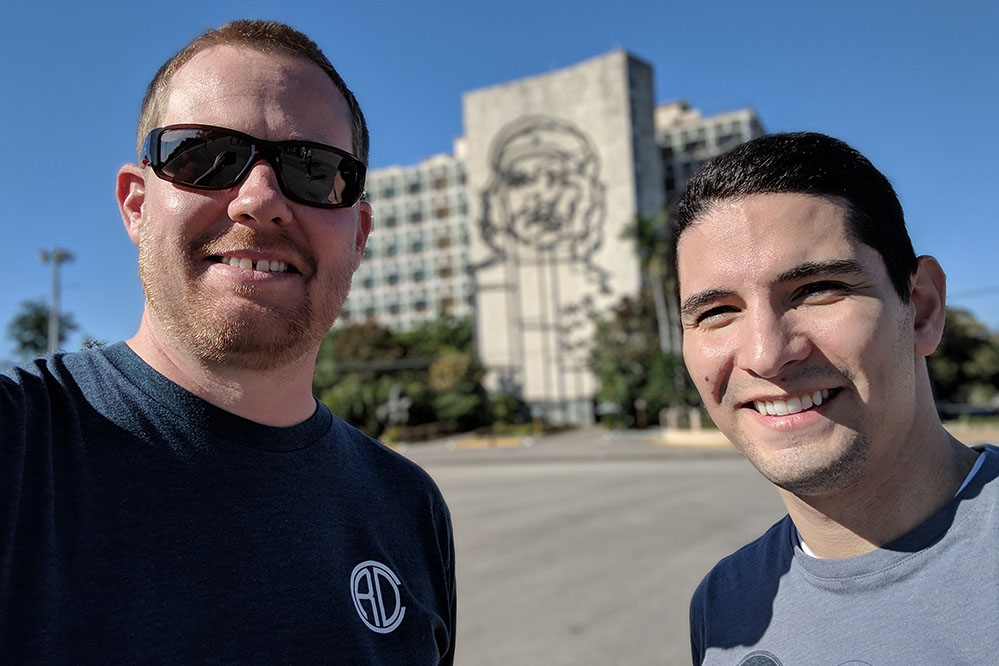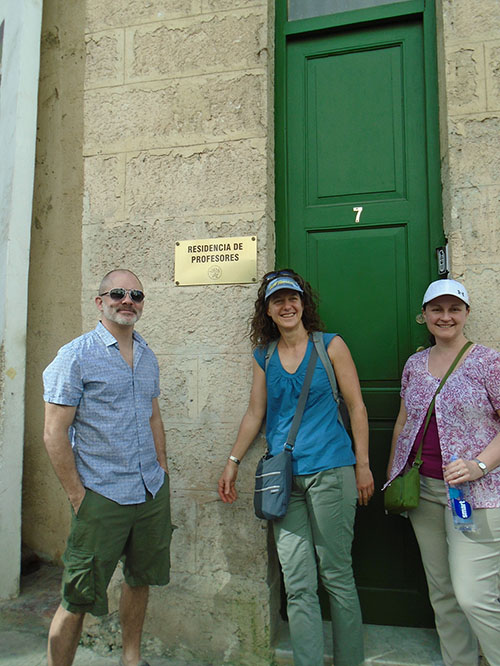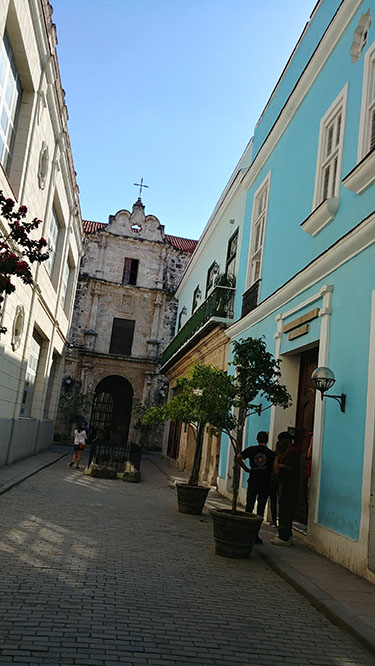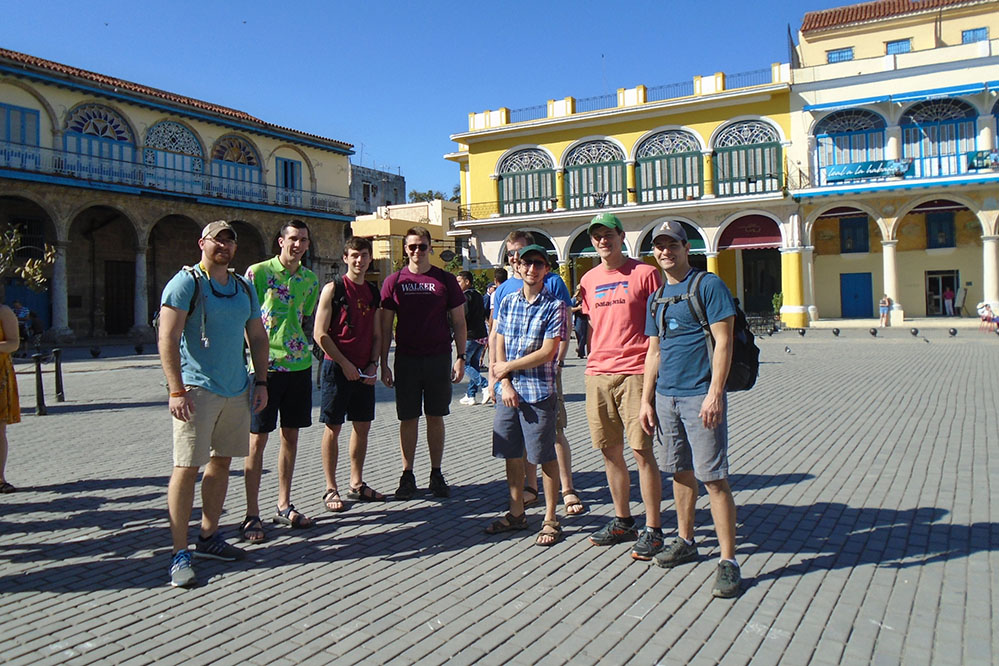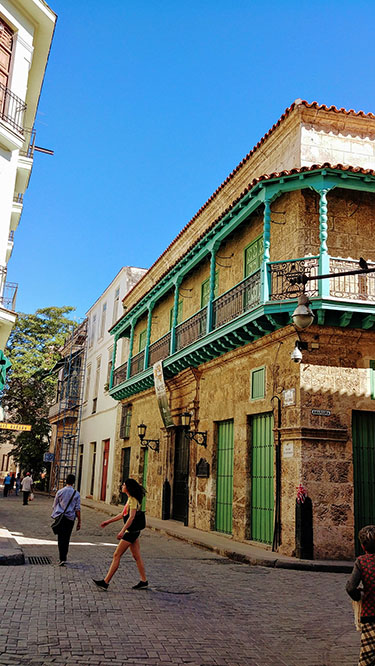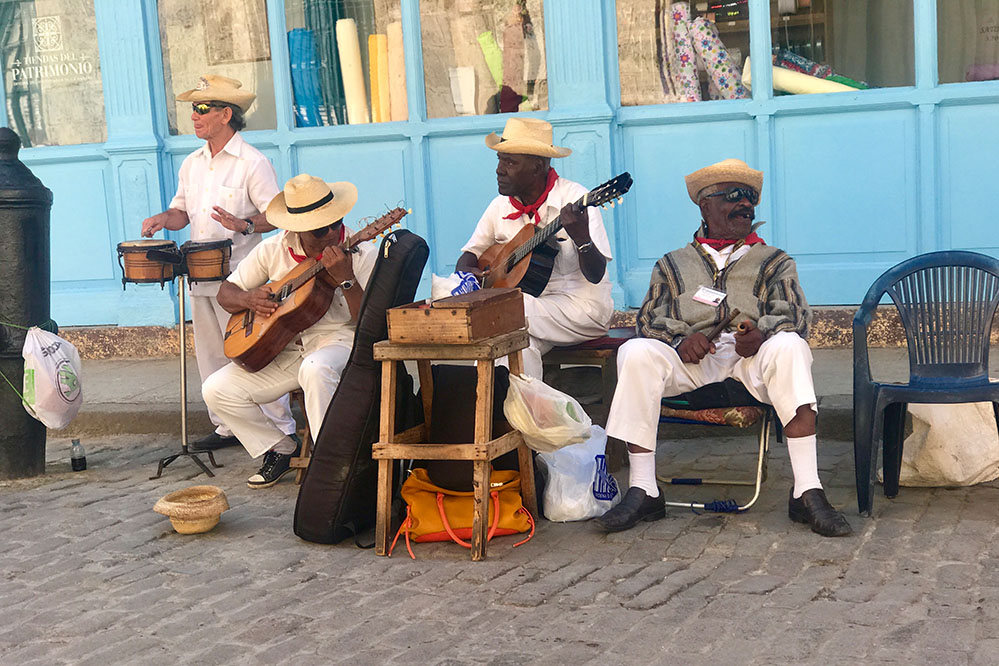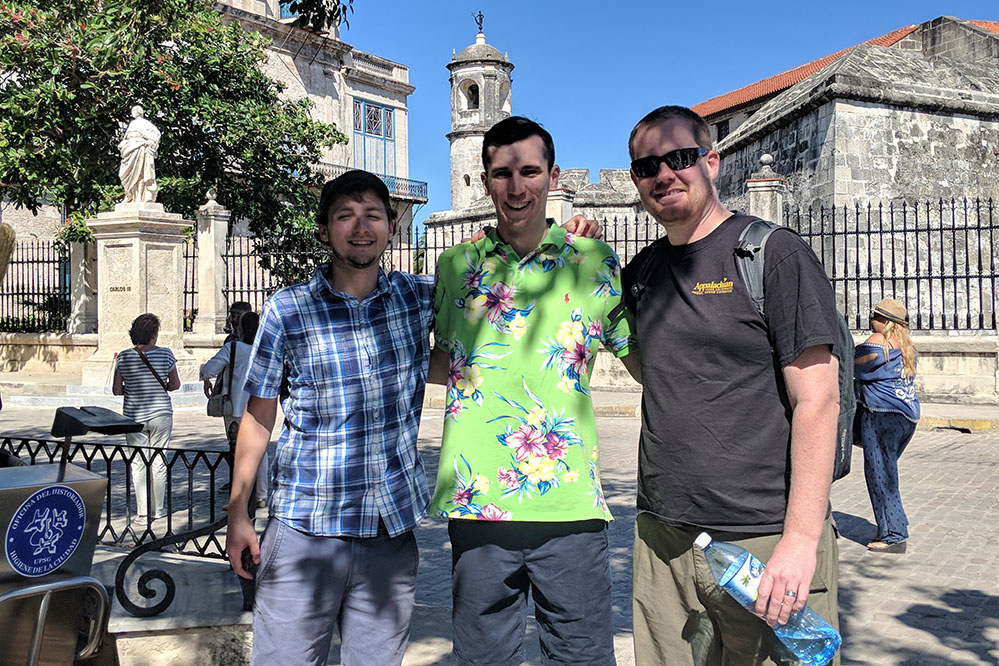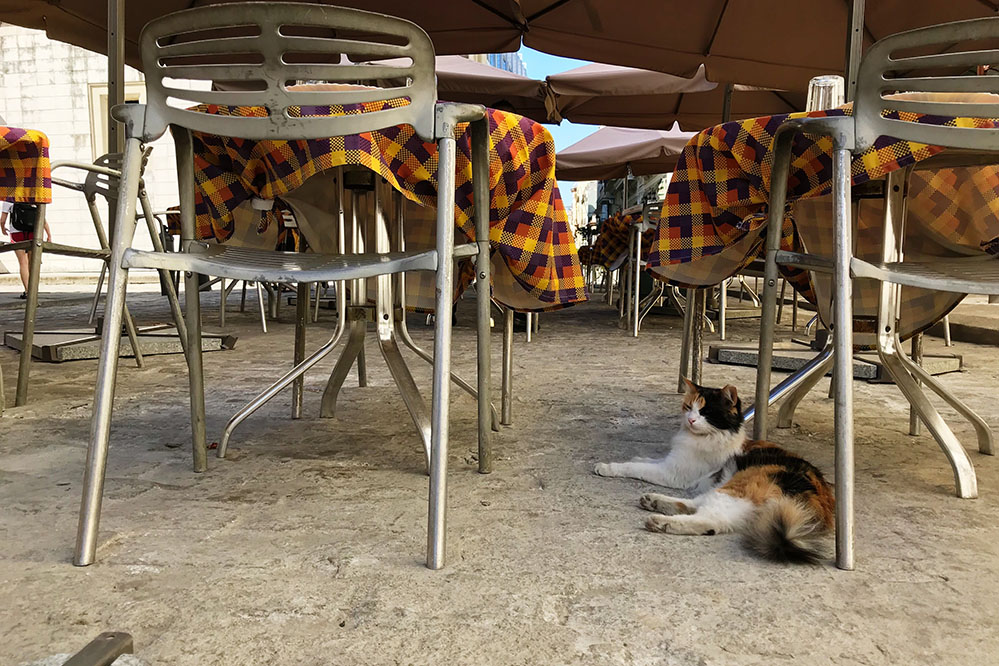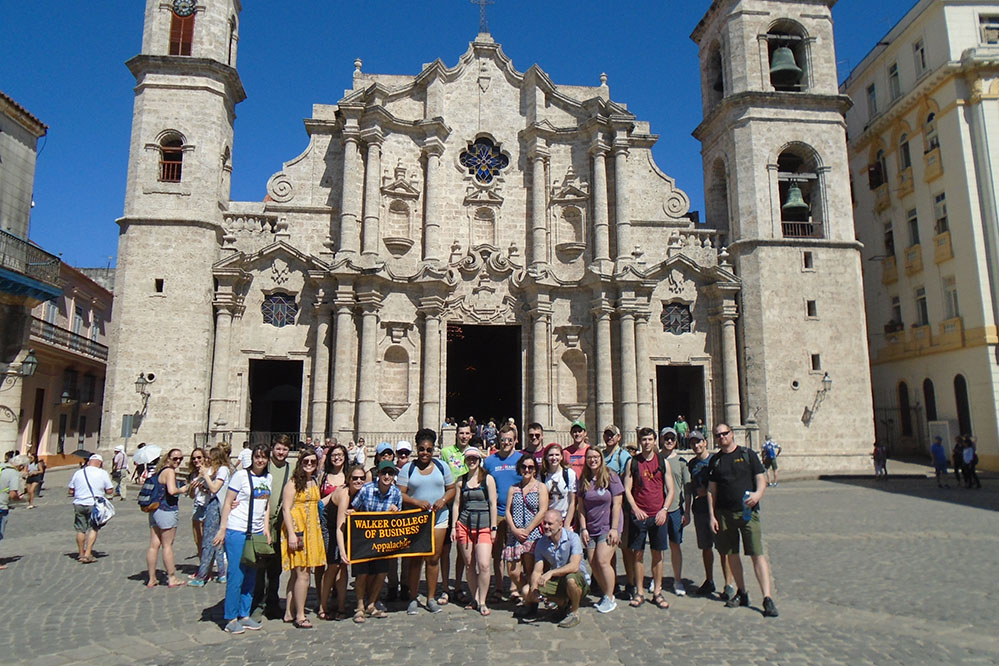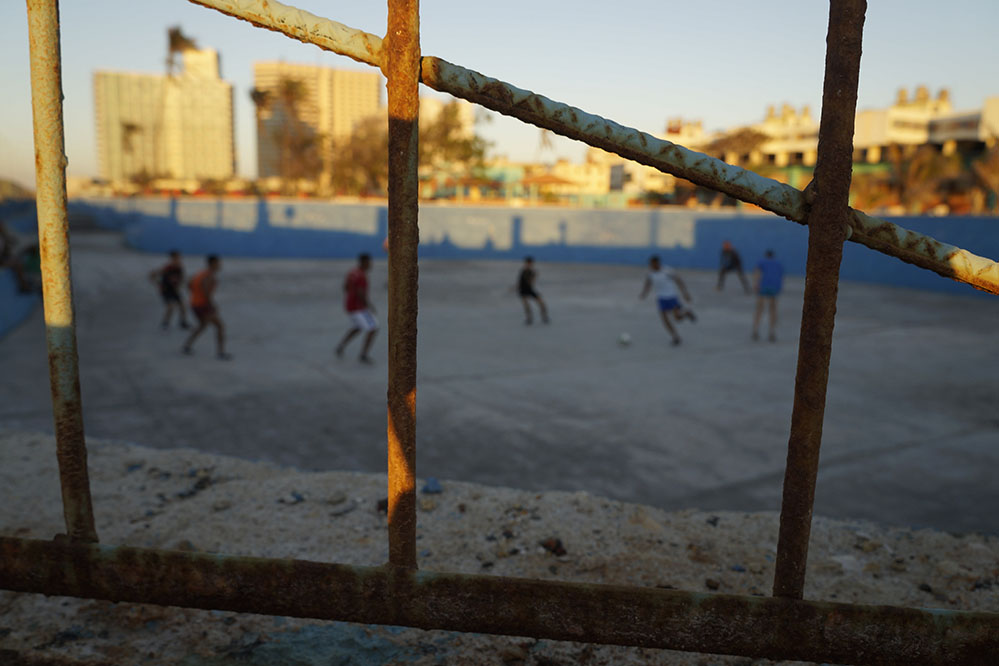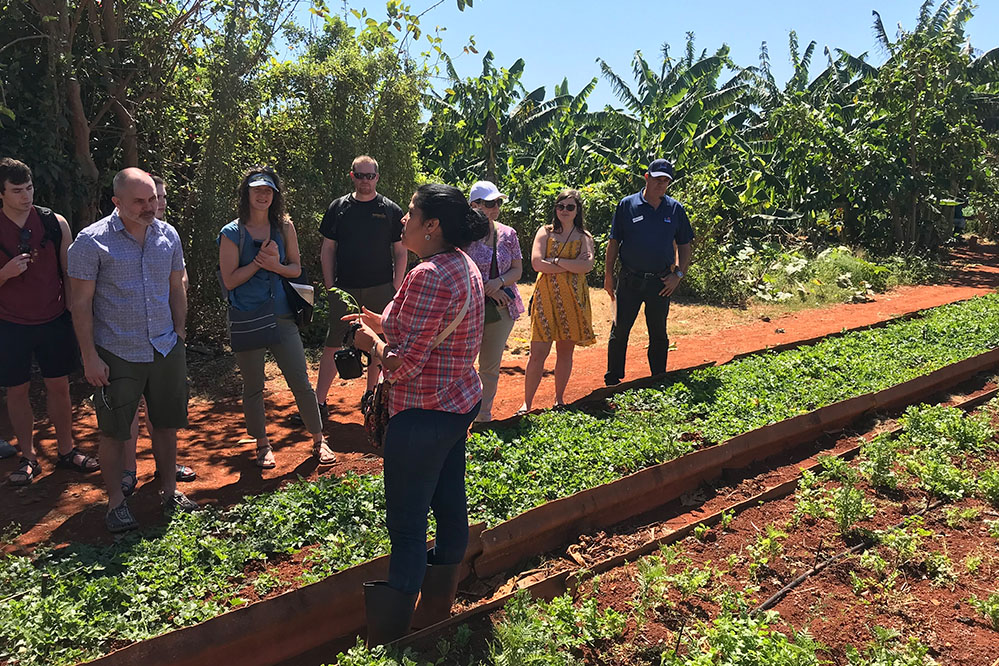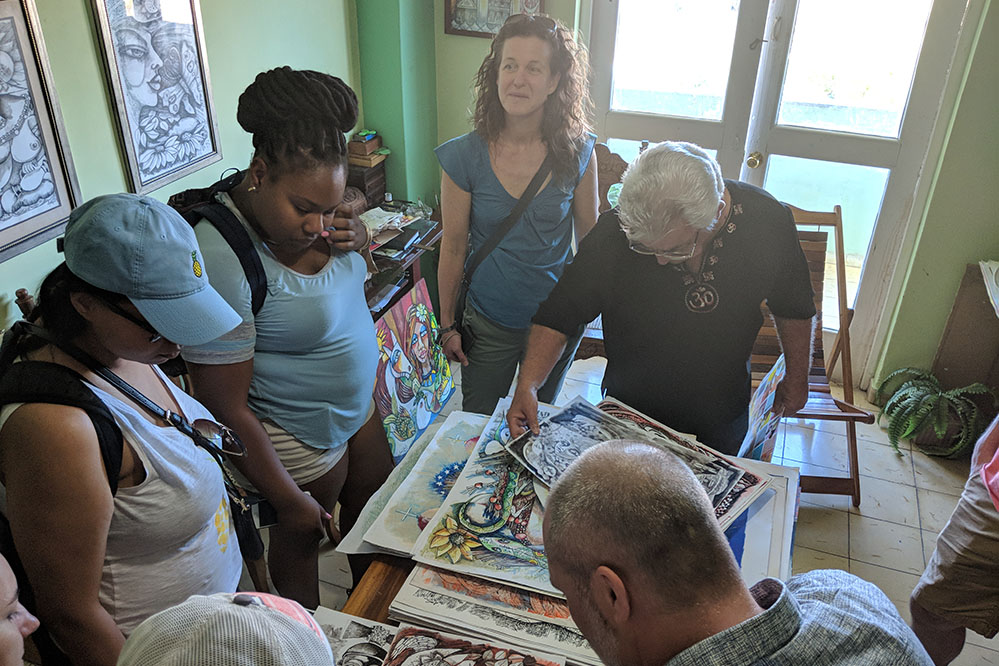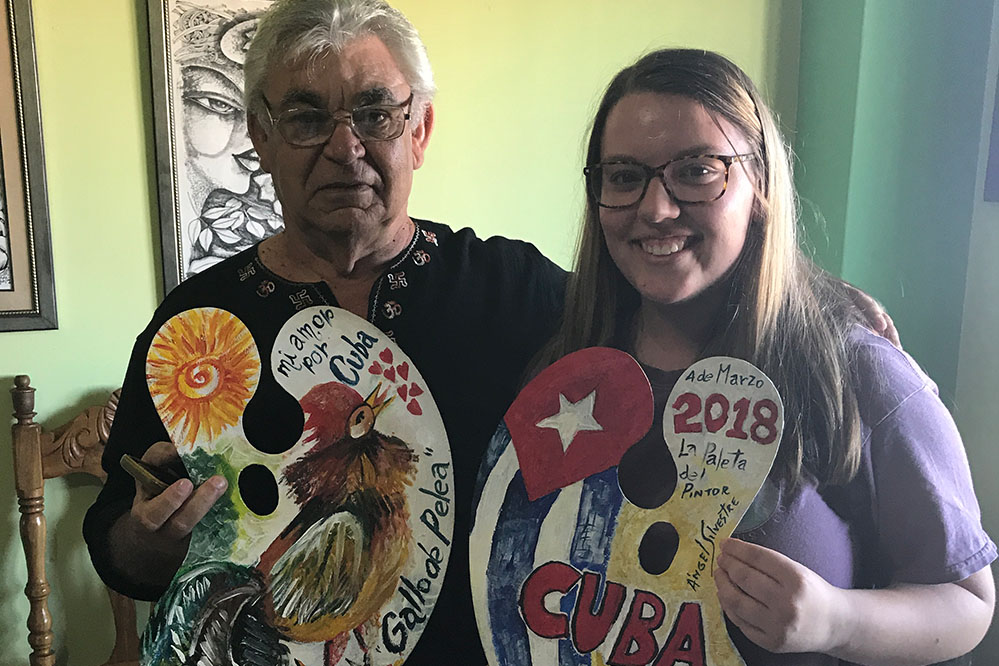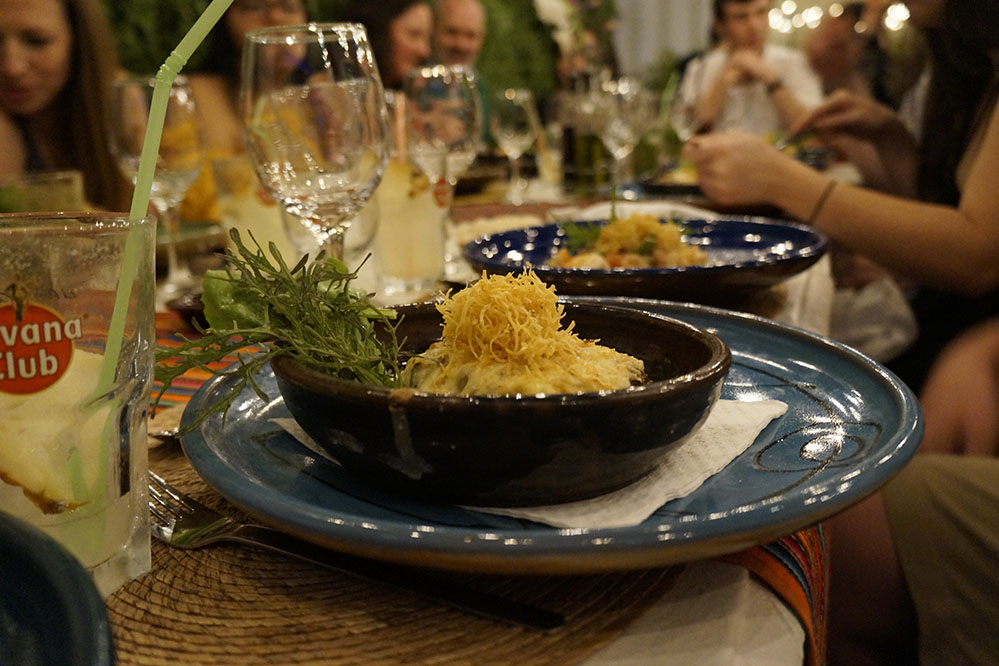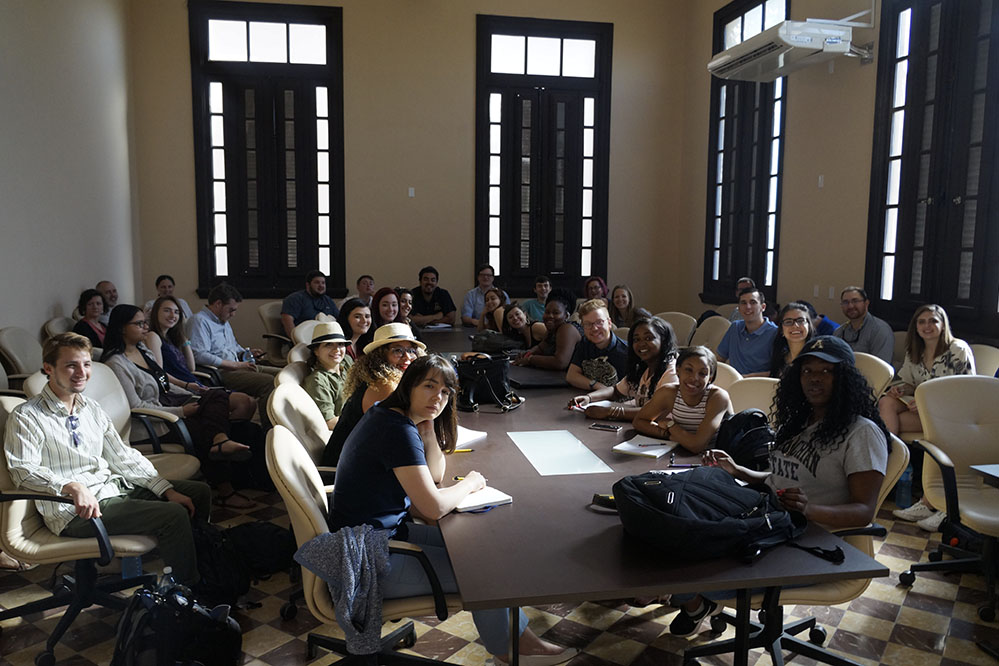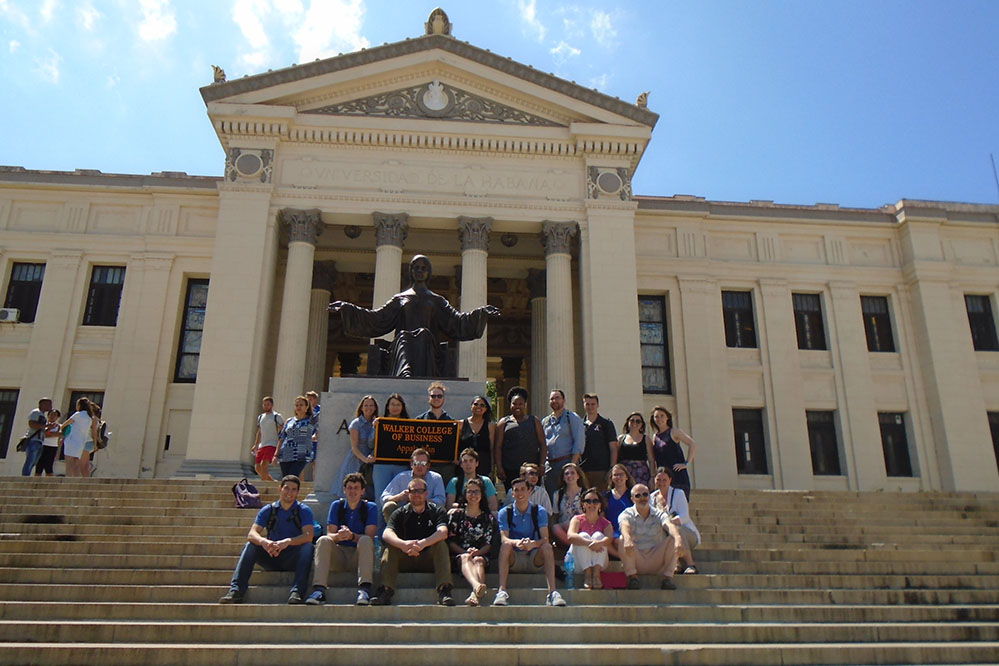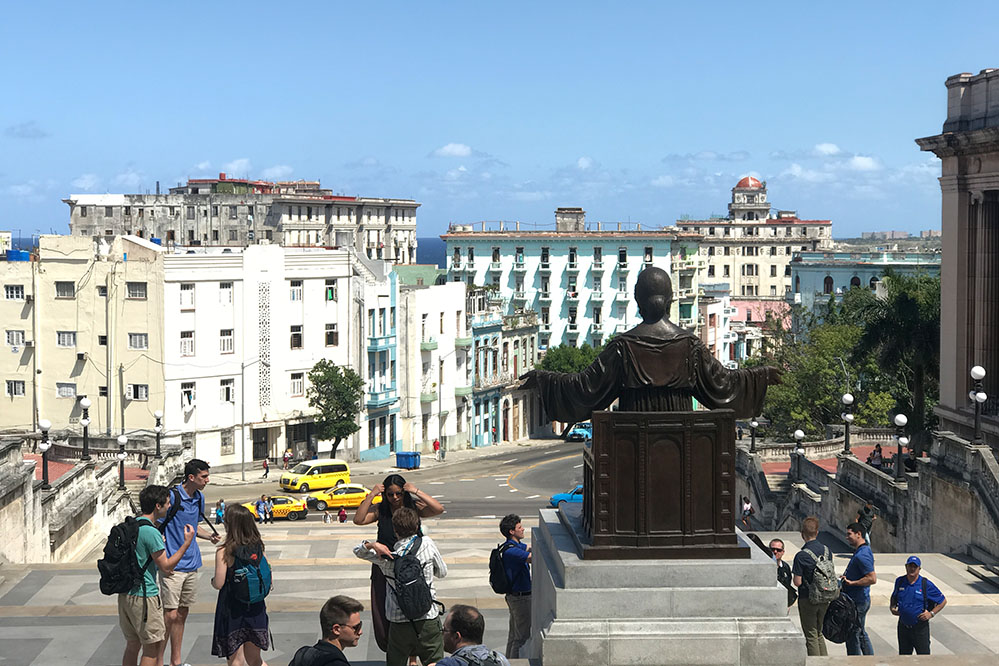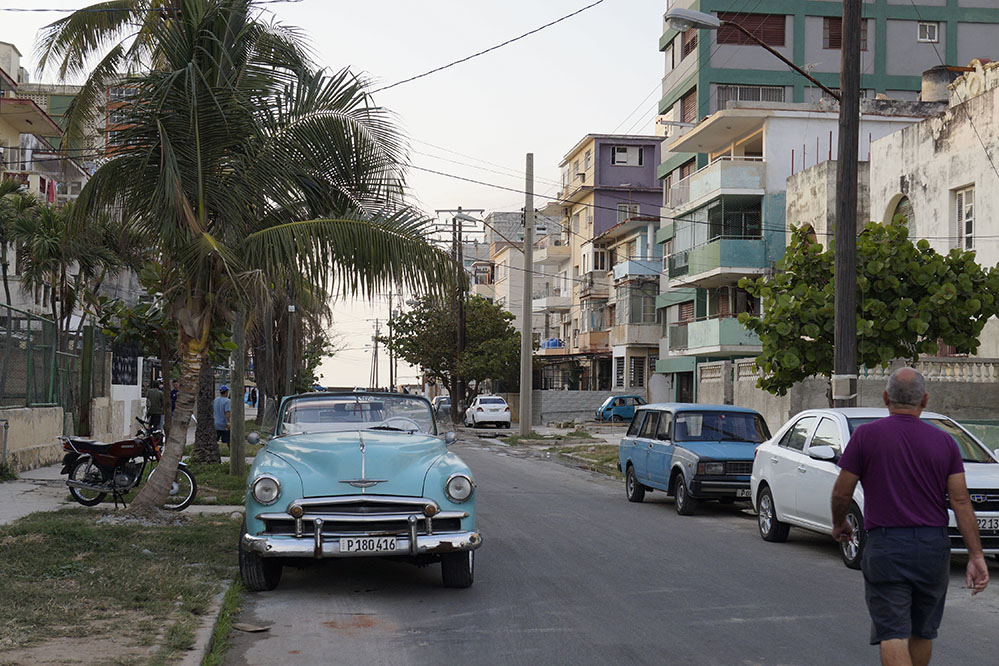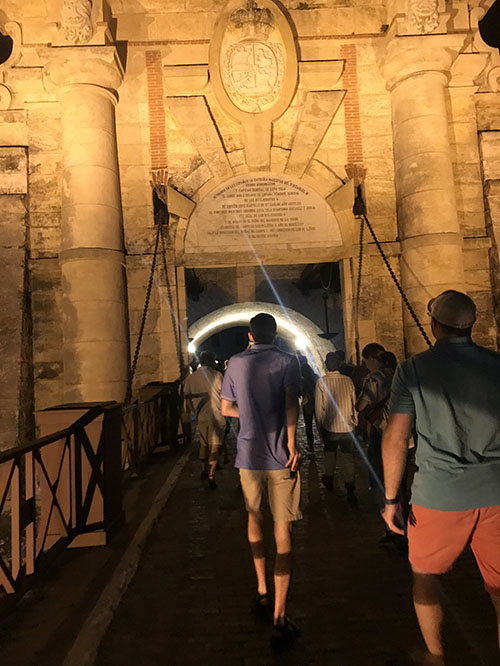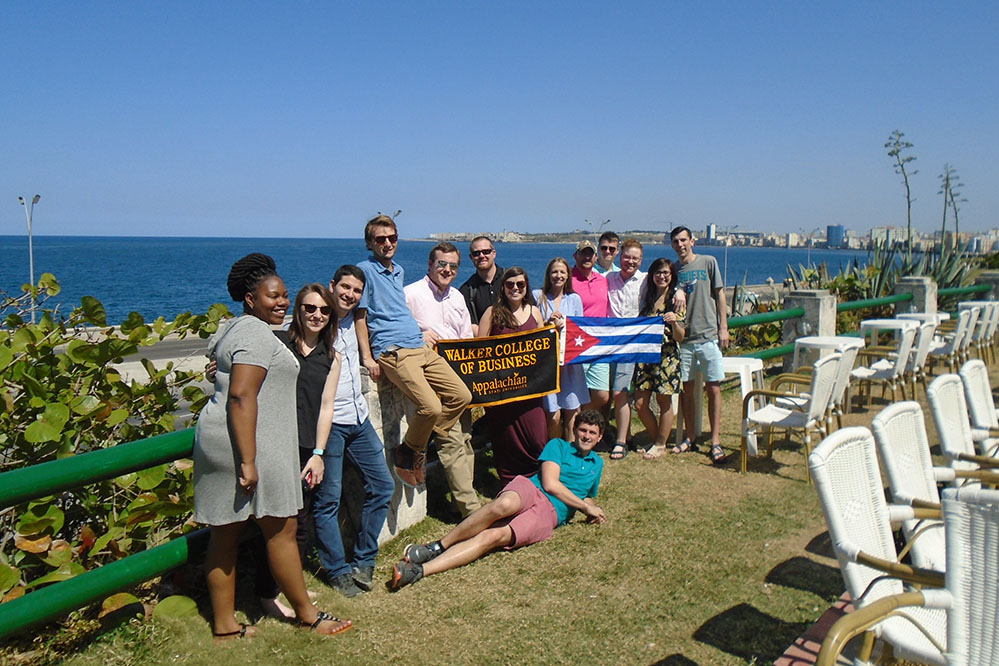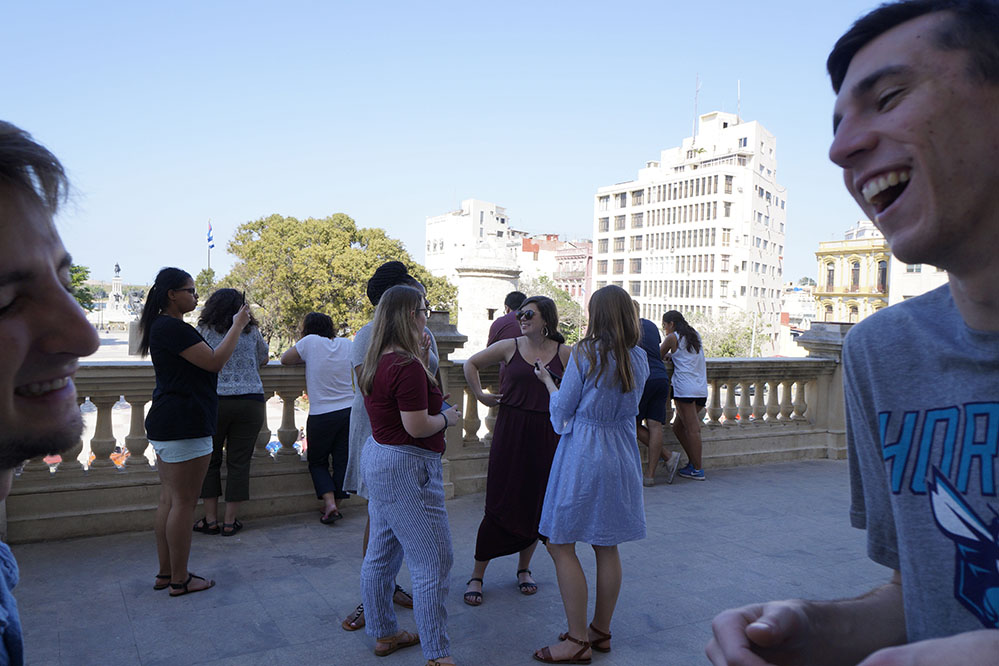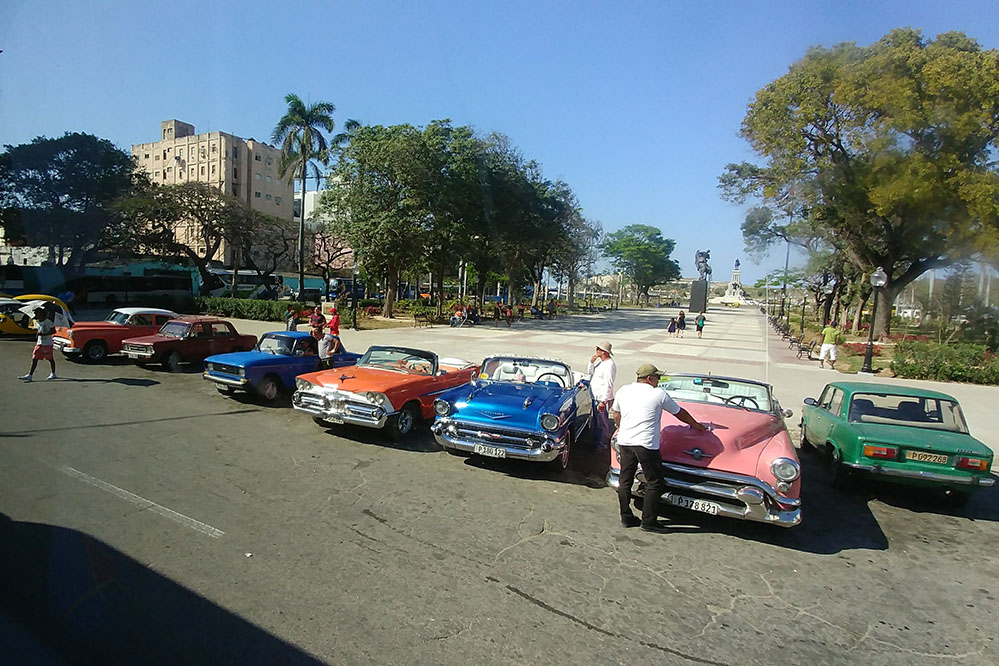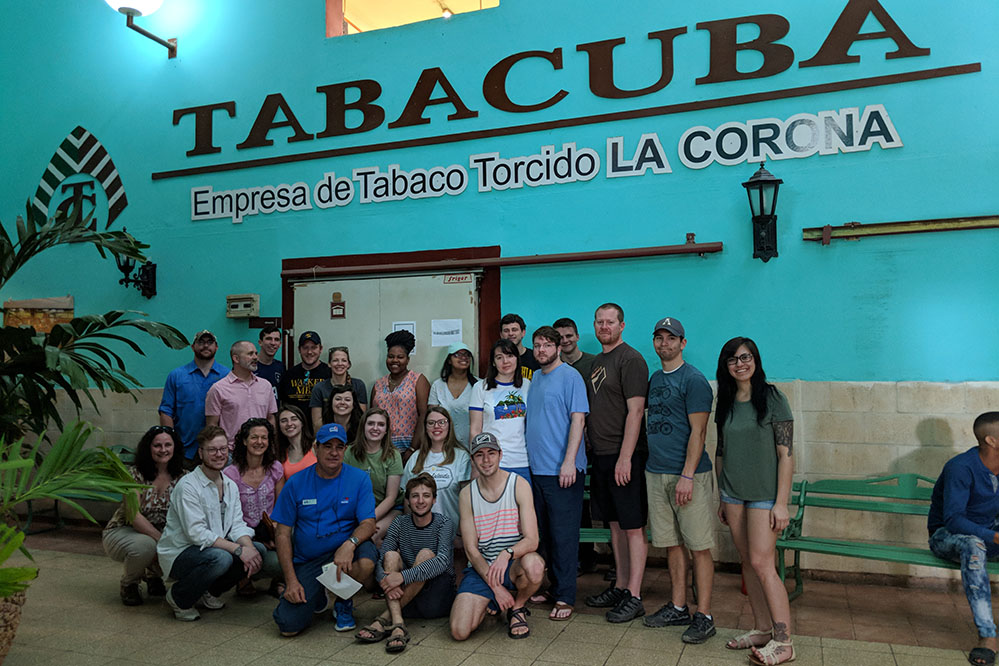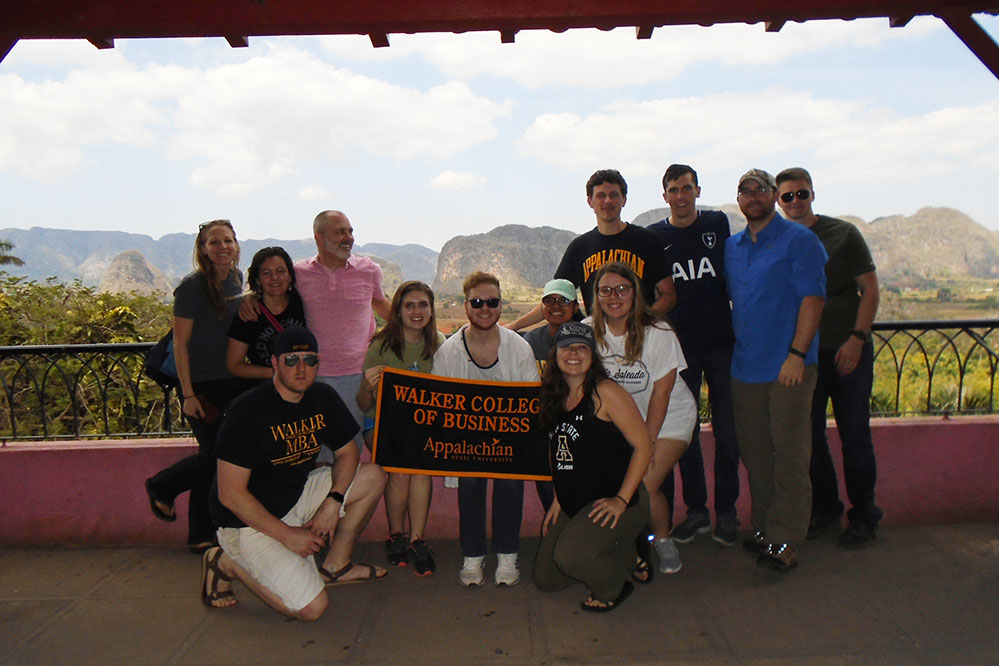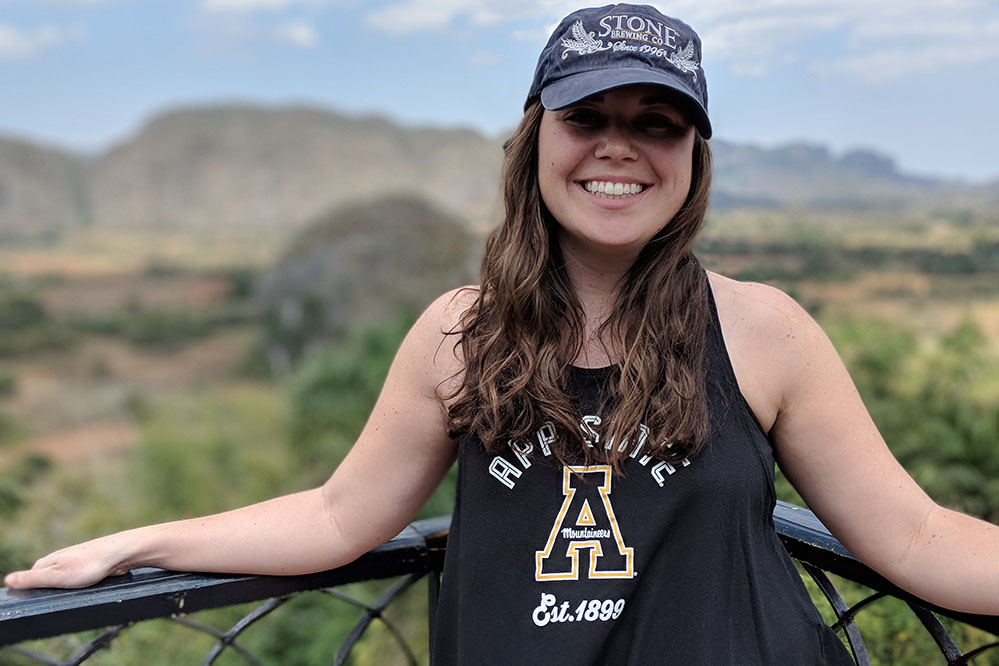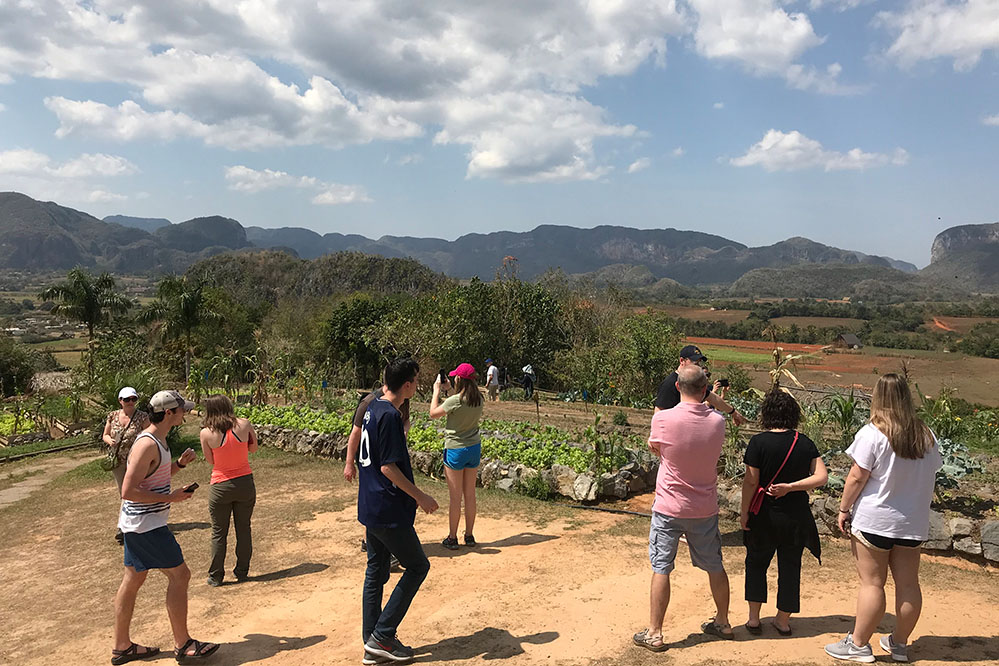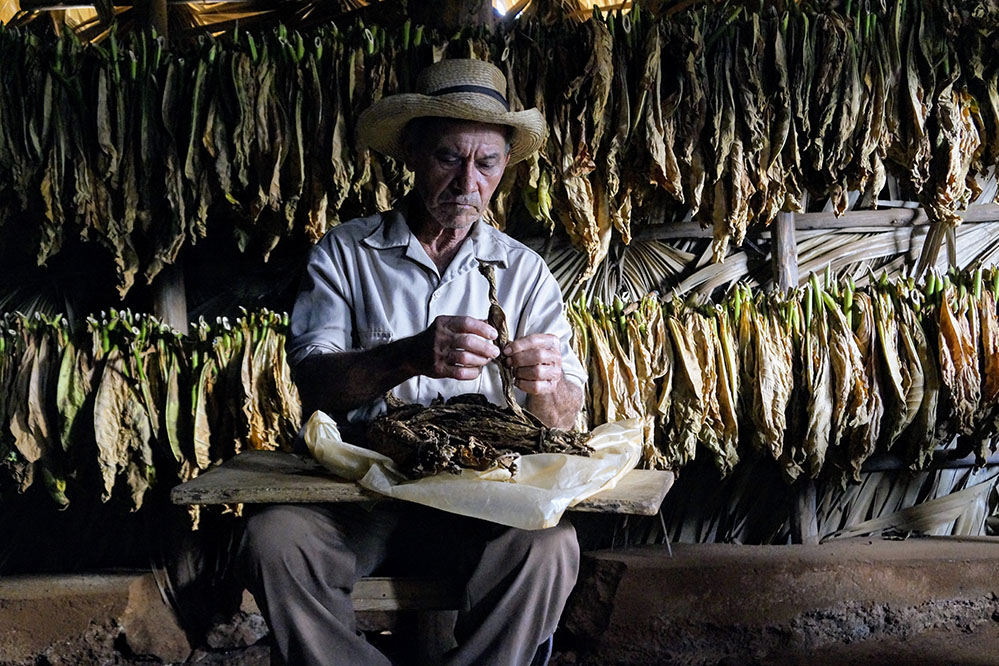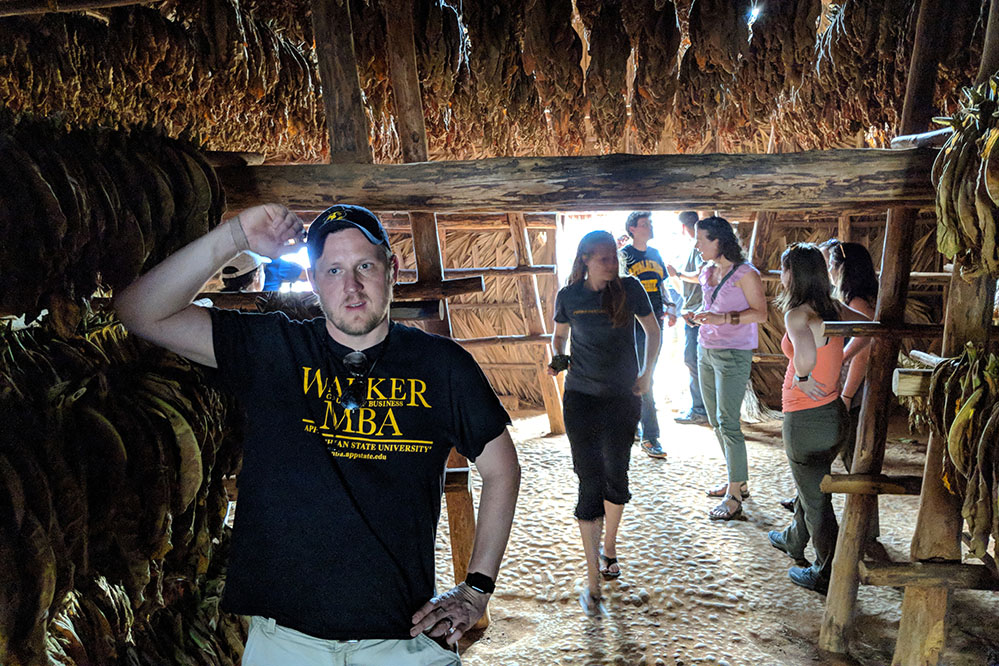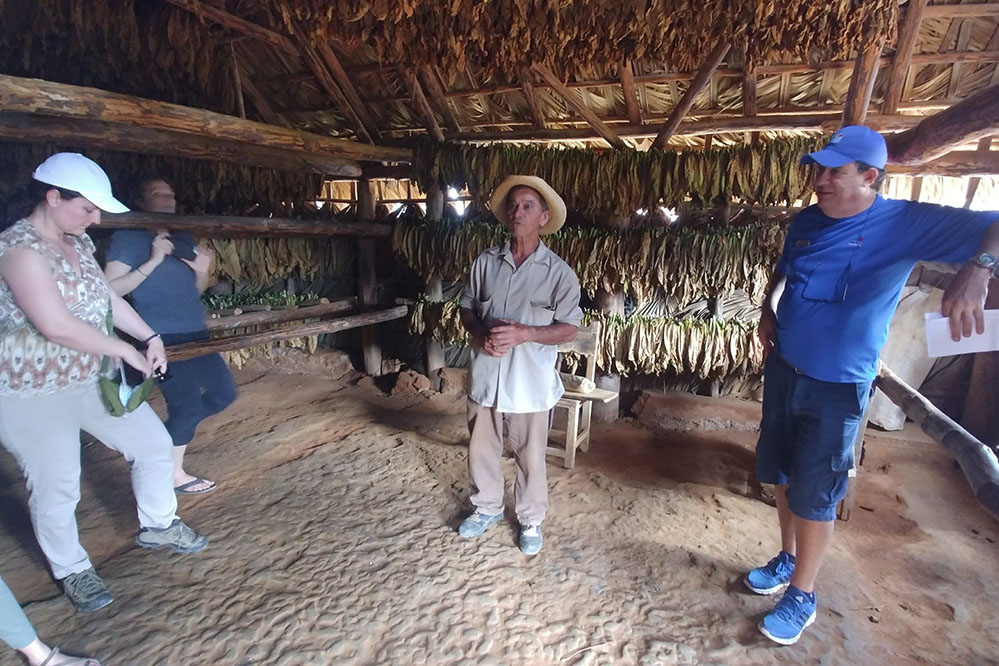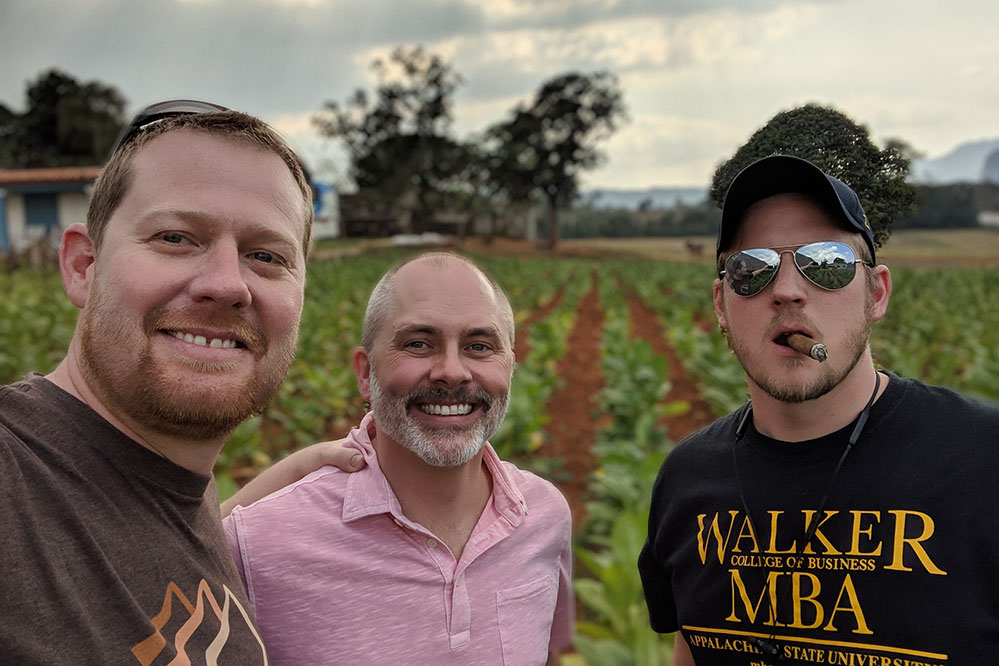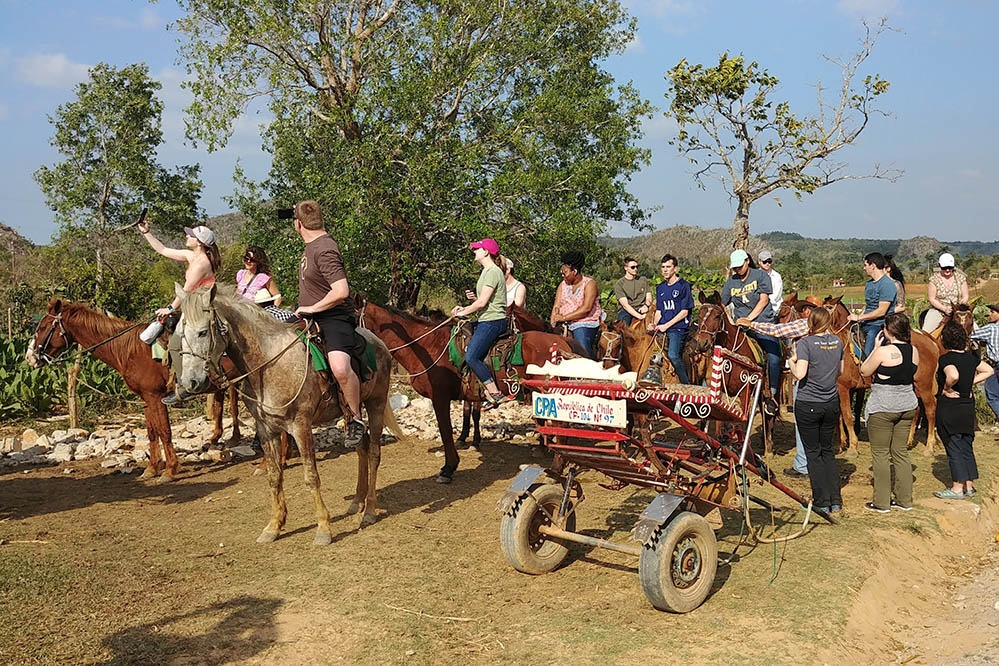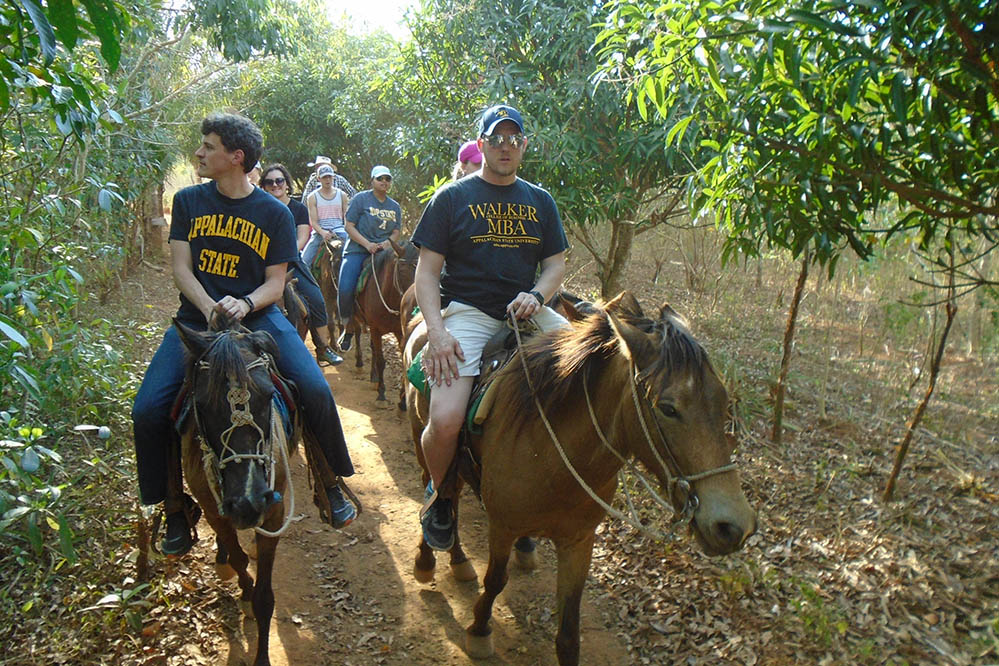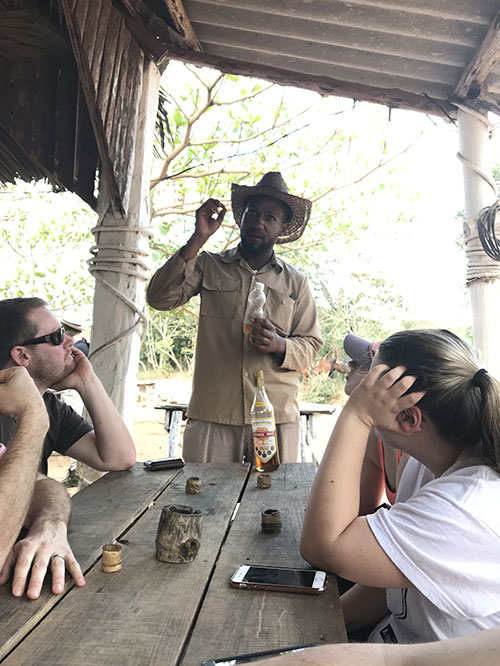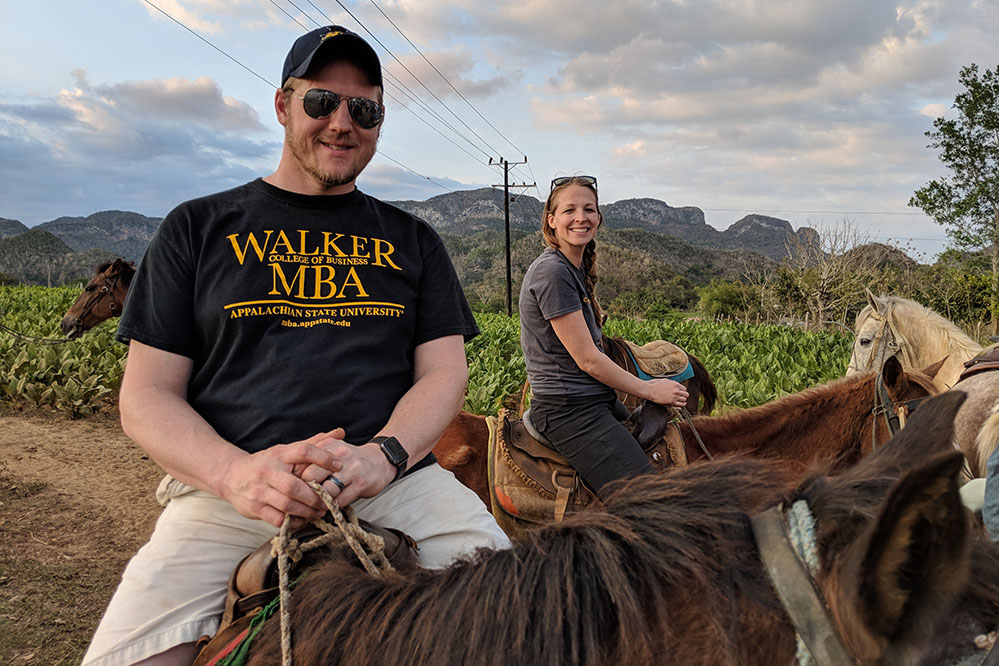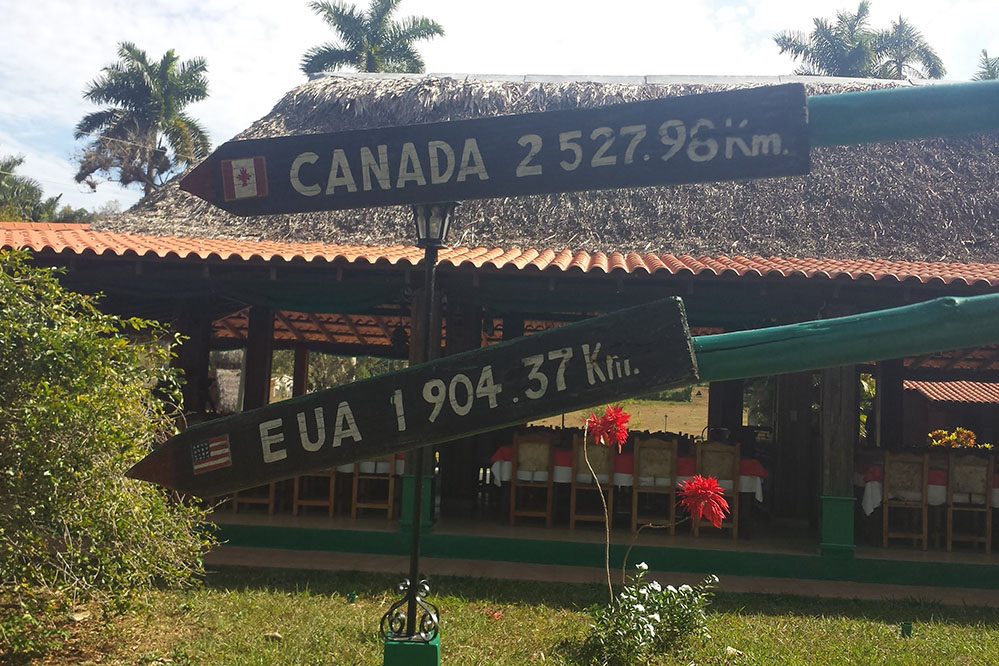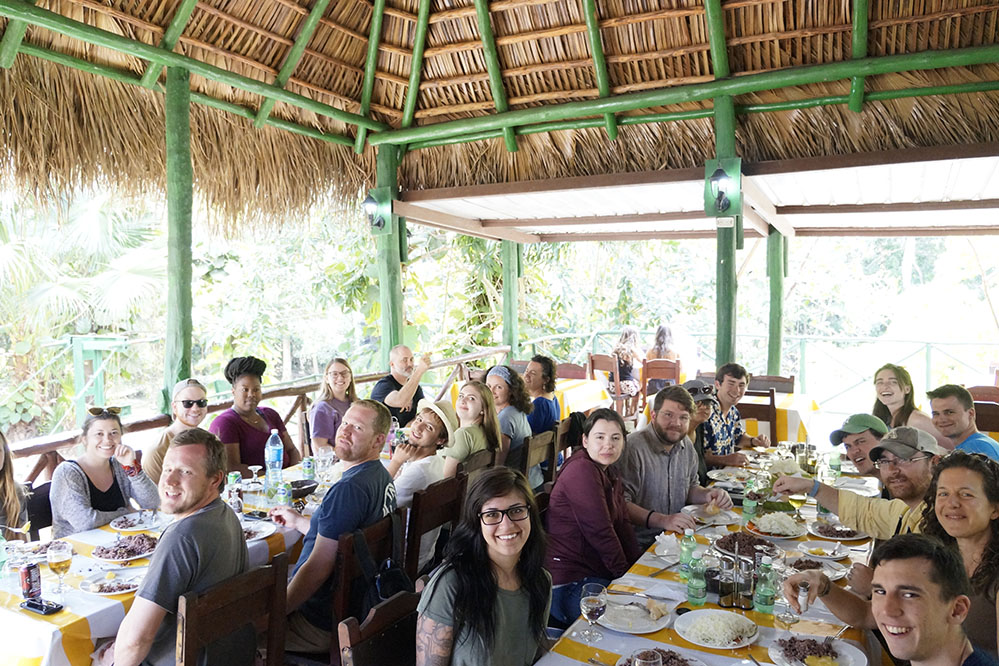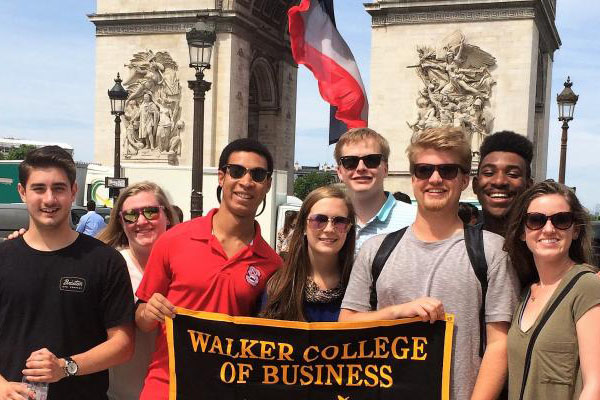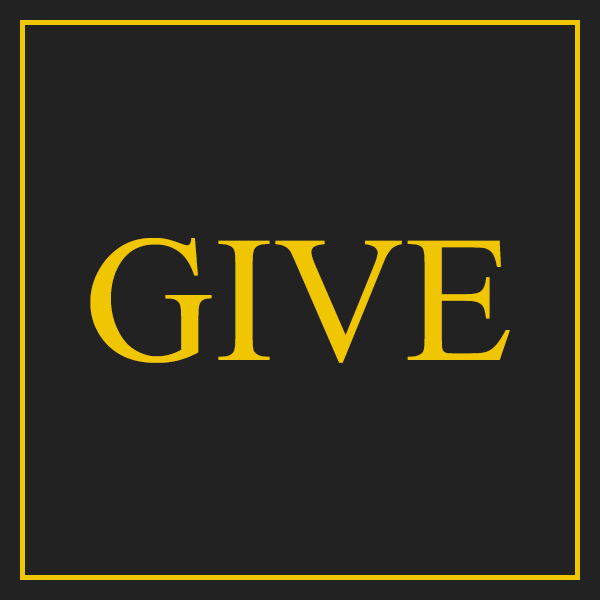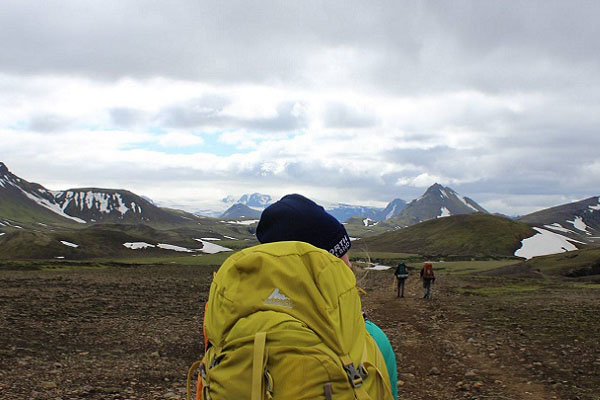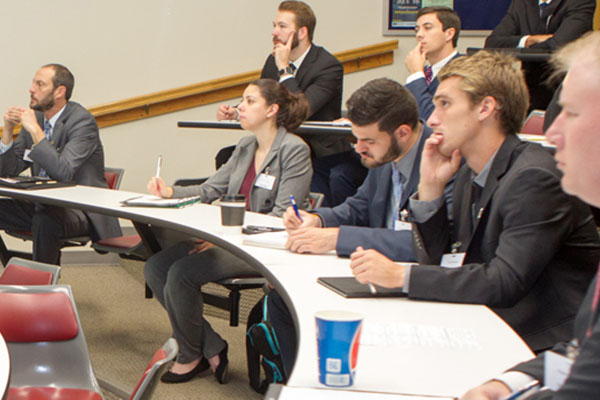Transcript
Dave Blanks: Hi there, folks. My name is Dave Blanks from University Communications and this is Master’s Matter. A little bit different style for this Master’s Matter because usually I am interviewing a professor in their office, along with one of the master’s students that works with this professor, and they talk about their research and how they work together, but this one is a little bit different because it’s for the MBA program. We’re focusing on the international component to the MBA program, more specifically the trip to Cuba. There are other destinations that MBA students can choose for traveling and fulfilling their international component, but this one pertains to the trip to Cuba that was led by Dr. Rachel Shinnar. Dr. Shinnar is a professor in the Department of Management, and every year she takes students to Cuba in conjunction ... it’s a relationship with the University of Havana. Dr. Shinnar, I’ll ask you some questions in just a minute, but before that, we’ll meet our MBA students. We have Chris Grulke and Ben Perez. Chris, let’s start with you. Hello Chris.
Chris Grulke: Hello.
DB: Hey Chris. So, are you a first-year MBA student?
CG: No. I'm on my last year, so I took a little bit of a different path. I went part time and am on my final semester currently.
DB: Cool. And Ben Perez is in studio as well. So, Ben, are you a … what year student are you? You guys are both second year, right?
Ben Perez: Yeah, we’re both second year, well, at least I think.
DB: Because that’s, usually the international trip happens on your second year. Correct?
CG: Most people probably do it that way.
DB: OK. All right, cool. So, Dr. Shinnar, what is your role as far as the international trip for MBA students?
Dr. Rachel Shinnar: So, MBA students have to take an international component to their degree in order to graduate. And one of the programs that we offer is the program to Cuba. Dr. Meznar, who is the associate dean in the College of Business, he’s the one who initiated this trip. He created it. He formed the relationship with the University of Havana, and I inherited the trip from him five years ago and I am now the official trip leader. I take a group every year. It used to be a combined trip, MBA and undergraduate. Starting this year, it will be an exclusively graduate course, and we will take graduate students mostly from the MBA program but also from across campus to go to Cuba and experience this very different place. And I think the reason we’re including an international component in the MBA is that the business world is becoming an increasingly international, increasingly global, and having an opportunity while you’re a student to go outside of your comfort zone and experience something different and be the outsider — the one who doesn't speak the local language, the one who maybe doesn’t understand fully the local customs — is something good to experience. It contributes to personal development and growth.
CG: And we had students that had never been on a plane before, students who had never traveled internationally before. So, it was very, very cool.
DB: Sweet. So, was this like a reason why you wanted to get into the MBA program, like the fact, or why you chose, why you chose App? Because are all MBA? Do all MBA programs include an international aspect, an international trip?
BP: I don't know. When I told —
DB: Or is that an App-specific thing?
BP: No. I told some people I know who were, who were also in an MBA program at a different school that we have this international component to it and they were kind of confused. They, they'd never, it’s not something that they were doing, but I don’t know, I imagine it’s common in other schools. But the reason why I chose the MBA program is because I’m doing engineering, and so they also teach business courses, and so then there’s this really easy option to just double major and get a double master’s. When I found out about the international program, I was actually kind of not very happy because it was required, and it was a required international trip that I had to pay for, but ...
CG: I’ll kind of second that, too.
BP: Yeah. And I, you know, I have a family —
DB: Sure.
BP: I have three kids under the age of four, and I have a wife, and so the financial aspect was a little troubling, but I have to say that I think it was worth it. You know, going on this trip was just really, it made a really big impression on me, and just getting outside of the country and going with people that you don’t know, and you know, bonding with them through the trip, and then experiencing the culture and the customs and coming back and the — it kind of changes your perspective.
DB: How did your wife feel about it?
BP: She’s still a little upset ...
DB: Uh huh, I bet.
BP: ... because I got to go to Cuba.
DB: And she got to hang out with the kids, right?
BP: Yeah, exactly. So.
DB: Well, so, forgive my ignorance, but what do you do on the trip? Is it just like a sightseeing trip, just like, let’s check this place out, let’s broaden our horizons?
RS: We try to make sure that there is a strong academic component. So, we meet on campus before we go. We learn about U.S.-Cuba relations, the history of Cuba and it’s fight for independence. It’s struggle for independence maybe is a better word. And then when we’re in Havana, we go to the University of Havana. ASU has an agreement with that university, and we receive lectures from some of the leading professors about various topics: political science, U.S.-Cuba relations, economy, economical changes, the economic system in Cuba, entrepreneurship, the health care system, the education system. So, I think this is not really going to Cuba to be tourists or to play tourist; the students are actually learning a lot and I've been going. This was my fifth time, and I learned something new every time. And so, we’re not really going as tourists. We’re going to learn about that country, about the relationship that Cuba has with our nation, about the Cuban people, history, culture, food. It’s a very broad experience.
DB: How was the food?
CG: The food was incredible.
BP: It was great, yeah.
DB: Alright. What was good?
CG: It was very fresh. I’d heard people that had been in Cuba before say that the food was monotonous and they ate the same thing over and over, but I thought it was incredible.
BP: Lots of vegetables. I just felt really good because everything did feel like it just came right from the farm. It was just great.
DB: Did you guys stay? Where did you stay when you were there? Different places or just on the campus? You just went to the lectures on the campus. You stayed somewhere else?
CG: Correct. So, we stayed in a hotel on the northern side of Havana. The Hotel Riviera, Havana Riviera. And it was excellent, I thought. Comfortable, clean.
DB: How many days is the trip?
CG: It’s seven days. We were there from ... we were in Havana from Saturday to Tuesday. Wednesday we picked up and went west to Viñuales and we were there for two days, came back to Havana on Friday, flew back out on Saturday.
DB: All right. Well, so what do you think you learned from going there? We’ll start with Ben. Did you have expectations when you went in, and were they challenged and what did you learn? That’s a lot of questions, but —
BP: No. Yeah. When I went to Cuba, I set kind of like a goal, like what I wanted to do, and that was to connect with the people. And it was really, that’s kind of broad, but I speak Spanish — well, I claim to speak Spanish — while I was there, just the ability to speak Spanish and communicate a little better really helped me to make better connections with the people that I met. We had a very packed itinerary, and that’s something that I really appreciated, but I also liked that we had free time where I could go out and roam the streets and talk to people, and it’s a very safe country, and you get there and the people are so welcoming. It’s amazing. They’re so, I mean, they're just so loving and kind, and just open. I don’t know how to explain it because I don’t know. I consider myself a little more reserved, and so to go into this culture where people are just, you know, they just welcome you in so freely, it was, that was a really nice surprise. That was something I really loved —
CG: I would say compared to everybody else been besides you, Dr. Shinnar, your, your Spanish was almost fluent or close to it, and so, you know, we would all huddle around Ben and walk around with him to see what people are saying.
DB: Ah, that’s cool.
BP: Connect with them.
DB: Yeah. Did you learn anything, Chris? What did you learn? What’s something you’re gonna —
CG: I learned that ... and I’ve continued to think about the trip since we got back all the time. Every day. I learned that one, America really put a hurtin’ on Cuba. You can see that they're closest neighbor has just really tighten the clamps down and stifled their growth, so I really hope that changes soon. The people were so happy, and you know, a lot of them didn’t have very much, and that’s, ya know, to show that you don’t need wealth or things to be really happy. I learned a lot about the economics and political situation, and kind of how that’s changed over the years, the history — a lot of that.
DB: So, Chris and I work together in the same department at App, and we got to see some of your pictures from there and it looked amazing.
CG: Yeah, the first thing I did was show everybody the pictures, especially of me, you know, driving the old taxis or sitting in the driver’s seat.
DB: You got to drive the taxi? I don’t think I saw that!
CG: No, just in the driver’s seat.
DB: OK, right. You were pretending.
CG: So yeah, they;re pretty jealous.
DB: That’s cool. Cuba is not the only place that you can go as a MBA student. What are some other places you can go, Chris?
CG: Yeah, I saw, I saw like advertisements for Amsterdam, China, Tokyo or Japan. Did I say Thailand?
BP: Yeah, I think the French Alps, French —
CG: Oh yeah. France. You can go to France. Brazil.
RS: I think the beauty of the Cuba program is that it’s so close ... two-hour flight and we’re there, and we can take full advantage of our first day and our last day. We don’t have jet lag. The climate is wonderful. We get away from snow in Boone, and we’re in the Caribbean sunshine. So, that’s one of the beauties of Cuba. And also, Cuba is seen a little bit as the forbidden fruit because you cannot legally go on your own as a tourist; you have to be part of some sort of program, and we offer that. And so, it’s a rare opportunity to go to Cuba where you could not go on your own.
CG: And I think that was a lot of the appeal for the students. I know that’s why I chose Cuba because I was like, well, I’ll never be able to go there by myself or without a group. I didn’t know what to expect until we got into the classroom and we were talking about the history and we did a presentation, and it was really nice to also meet other students that were going so that the airport wasn’t the first time that we were getting to know each other.
DB: We’ve got to share some pictures from the trip. Can we do that? Like on the website? That would be cool.
CG: Yeah, so we’re putting together a photo diary of the trip.
DB: So, we’ll definitely link to that.
CG: Yeah, we’ve chosen like 50 pictures, and they’ve got captions, and it kind of talks about our progress through, through Cuba. Yes. We will link to that as well.
DB: Ben and Chris, before we go, why did you choose Appalachian for the MBA program? Did you guys go to undergrad here?
CG: I did not. I am a staff member at the university, so it was kind of a no-brainer —
DB: Right, makes sense.
CG: — to walk out of work and down, you know, 200 feet to the business building and take classes after work.
DB: OK, that makes sense. That’s not super compelling, but it makes sense. Ben, what about you, man?
BP: I didn’t go here for undergrad, but I got accepted to the engineering physics department, or in the master’s program in the department, and they were offering this dual master’s degree, and so, I figured, well, while I’m here, why wouldn’t I take that? So.
DB: You have a lot going on, Ben.
BP: Yeah, I do.
DB: Yeah, you really do. How old ... all your kids are under four?
BP: Under the age of four.
DB: Under the age of four and you’re taking, you’re getting two degrees and then you’re going to Cuba, you know, you’re a globetrotter.
CG: Well, I have a question for Dr. Shinnar.
DB: Yeah, please.
CG: So how did you see the group change over time? And like, talk us through any dynamics you saw.
RS: So, one of the beautiful things about the Cuba program is that we have very limited internet access, so people are not on their phones, they’re actually with each other, which is I think a very different dynamic from how we behave when we’re here and we have Wi-Fi everywhere we go. And in Cuba, it’s very limited, and so people interacting a lot more than they would if we were maybe in a country where that was free Wi-fi everywhere. So, that’s one thing that I really like about the Cuba program. I also like the opportunity to actually get to know students because I don’t get to do that in the classroom. In the classroom. I see students twice a week for a couple hours, and I don’t really get to know anything about them. In the Cuba program, the students present their research topics before we go and after we come back, and I get to see the dynamics between them and it was really nice, especially in this group, and like I said earlier, I don’t know what the secret sauce was this year, but there was a really strong cohesiveness that built with the group, and our guide would come up to the bus every morning and say, “Good morning, my good family.” And I think that by —
CG: Hola Andreas.
RS: — and I think that by the end of the week, we kind of felt like a family. There was this really strong cohesiveness, and people were supportive of each other and embraced each other. And we had people from all walks of life, undergrads, graduate students. We had a nice mix of racial diversity. We had younger students, people who had never been out of the country, people who were experienced travelers. And this group was also adventurous while we were in Havana. We had one free night, and they all went to see a baseball game with local Cubans.
DB: Awesome!
RS: And I think they had an amazing experience. And I wish I had been there. I was entertaining some of the Cuban professors for dinner. This was something that was very unique about the group this year.
DB: Cool!
RS: They really wanted to experience Cuba from the Cuban perspective and not from the tourist perspective.
CG: Didn’t hurt that we had a phenomenal tour guide and driver. Everybody just connected with them as well.
RS: Yeah. So, the guide and the driver were with us every day, all day, all week long. And they become part of the family, too. They’re featured in our photo album, and everybody wrote them a very beautiful thank you card before we left. And I think this is a really long-lasting experience and memory.
DB: That’s awesome.
CG: I’ve already done a little Facebook chatting with Andreas yesterday.
BP: There were so many amazing aspects of the country, or at least of that part of the country that we saw.
CG: Ben, was there a favorite part of the trip, or favorite day or favorite activity that we did?
BP: I really loved the baseball game, so Cuban —
CG: Yeah.
DB: That’s amazing.
BP: Yeah, Cuban baseball games are incredible. They have what you call an animador, which is someone who gets up, and they kind of like, they lead the crowd —
DB: The hype man, the animator!
BP: Yeah, right! And he’s not a cheerleader. He’s an animator —
DB: Right, yeah, yeah.
BP: And he was going from the minute we got there to the minute we left. He was three or four hours just constantly going, going. He was so high energy and so fun. He found out that we were Americans, and he loved it. He was like, “Oh wow. Hey, do you know this and know this?”
CG: Where were you guys sitting?
BP: We were over right behind him.
CG: Oh, like third base?
BP: Yeah.
CG: Did you see us behind the first base dugout?
BP: Yeah, yeah totally.
CG: Oh, OK.
BP: And you were kind of heckling the Mexican team, weren’t you?
CG: I just wanted a baseball.
DB: What?
CG: I just wanted a baseball.
DB: You were trying to get a baseball from the Mexican team that was playing?
CG: Yeah.
DB: Did you get one?
CG: No, I didn’t get one.
DB: Nope, nope.
BP: I think we were on Cuban TV like four times, because the animador would always, you know, call to the camera and whistle, and so we’d all get up right in front of the camera. So, we were probably on Cuban TV.
DB: That’s awesome.
BP: At least once.
CG: So, Dr. Shinnar, after, and maybe you say this to every group, but I just felt like we had such an amazing time, no drama. How do you set up for the next trip?
RS: So, I actually, I’m not sure I will be able to replicate the experience we had this year because it was truly exceptional. There was no drama, there were no behavioral problems. Everybody was on time, wherever we needed to be, behaved in ways that I was feeling very comfortable in the way that we represent the university and the U.S. So, we really had zero problems this year, so it’s going to be hard to replicate, but I just want to go back to the question that you asked about the favorite part of the trip. So, our farewell dinner, we always try to step it up a notch with the restaurant that we go to for our last night. And so, we went to a very nice restaurant, and then my co-leader, Dr. Whitaker, asked everyone to step up and share what their biggest lesson was, and every one of the people who came with us on the group, all the students and all the faculty, everybody got up and shared, and our guide was standing in the corner of the room listening, and so many people spoke about how welcoming the Cuban people were and how they felt wanted, and welcome and appreciated, and I could tell that our guide was really moved by what everything that students were saying. And I was very moved as well, because it was really sincere, it came from the heart and it was something that was very unique about this group. That I think everybody took this as a great opportunity to learn and not just as a trip to Cuba to party. And I think that was one of the variables that made the big difference in this year’s group.
CG: Well put.
RS: Yeah.
DB: Chris, we haven’t gotten your, have we gotten your favorite moment?
CG: I thought this wouldn’t come back to me.
DB: What was your favorite moment? It’s a good question.
CG: Yeah, that’s true. It’s hard to pick. I felt like every day we were there, like it was just the best day we’ve had, but to that point, you know? I like the beach day. Of course, I’m — what beach was it?
RS: Cayo Jutías.
DB: Alright.
CG: It’s just beautiful sand, beautiful beach. A full day to just relax and unwind. I really liked seeing the University of Havana and learning about their educational system. In Cuba, you don’t pay for education all the way through your master's, which is not like it is in America.
DB: It’s a little different.
CG: Yeah. Some of the times where we were able to just kind of cruise out on our own, or like enjoy ourselves at a restaurant, that was cool too. Just kick it around with cool people.
DB: Dr. Shinnar, or where can people find out more about the trip to Cuba?
RS: So, the College of Business has been part of our website that’s focused on international programs, and all the programs are listed there and the links in the emails for the trip leaders would be there. The Office of International Education and Development, they also have an international page with all the different trips. The easiest way is just find out who is the trip leader and reach out to them.
DB: Cool, just send an email?
RS: Yep.
DB: Well, it sounds like an awesome time, y’all. Thanks for talking to me about it today. Anybody have anything else to add?
CG: Sign up for Cuba.
DB: Go to Cuba.
CG: If there are any spots left, there might be like 20 people from last trip going again in January.
BP: If we have the same tour guide. Oh yeah, definitely.
RS: I’ve been asking for him every year since I first met him three years ago.
DB: Let’s give him a shout out. What’s his name?
RS: Andreas Perez.
DB: How do you say his last name?
RS: Andreas Perez.
DB: Alright. Andreas — that was a terrible R roll, I’m sorry.
CG: Let’s give a shout out to Rolley.
BP: Oh, Rolando, the bus driver. He was amazing.
DB: Man. Well, Dr. Shinnar, Ben Perez, Chris Grulke — thank you all so much for being here today.
RS, CG, BP: Thank you.
